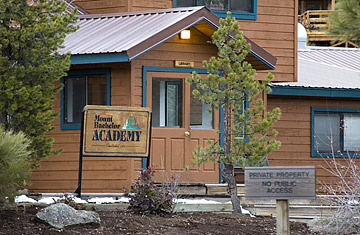
Mount Bachelor Academy, near Prineville, Ore.
(4 of 4)
Roots in Utopian Principles
The techniques that Mount Bachelor allegedly uses, while unconventional, are not new. They are similar to the tenets of the once popular "human potential movement" of the 1960s and '70s, which purported to change people's lives through intense emotional experiences. The movement grew out of the practices of Synanon and other California experiments in utopian living, which later helped spawn so-called large group awareness training programs, such as LifeSpring and est.
Synanon began as a drug-rehabilitation program before morphing into a controversial cult and is credited with putting forth the idea that confrontation and boot-camp-style breakdown tactics could cure teen misbehavior and addiction. Synanon's confrontational techniques influenced est and LifeSpring, which began selling weekend seminars designed to prompt emotional breakthroughs in participants.
Food, sleep and access to the outside world — sometimes even to the bathroom — were strictly controlled. Using intense role-playing, humiliation and physical experience, the seminars attempted to liberate people from victimhood by teaching them that they are ultimately responsible for everything that happens to them, including being a victim of child abuse or rape.
Mount Bachelor's Lifesteps seminars appear to share these tactics and philosophy. Several of its top employees formerly worked at a now defunct chain of troubled-teen programs known as CEDU, which was founded by former Synanon members. "The process of breaking kids down is very much integrated into the therapeutic milieu," says Kat Whitehead, executive director of the Community Alliance for the Ethical Treatment of Youth, an expert on such abuse, who has testified before Congress on the topic. "Unfortunately, that seems to be very common, at least in the private facilities."
Although many people report being helped by cathartic seminars, studies suggest that programs like LifeSpring do not produce lasting change. Indeed, in the 1980s and early 1990s, LifeSpring lost millions of dollars in lawsuits related to suicides and psychiatric hospitalizations of participants.
Most mental-health experts today strongly disagree with the use of brutal confrontation or humiliation as therapy — particularly for vulnerable youths who have troubled pasts. Research suggests that feelings of being out of control characterize the typical patient's response to traumatic life events; consequently, recovery requires the avoidance of coercion. Experts say that pressuring trauma victims to retell their stories against their will tends to increase stress symptoms rather than alleviate them. And brain research associates feelings of shame and humiliation to stress responses that exacerbate depression and anxiety and may contribute to physical illness. In addition, isolation from parents, except in situations where they are abusive, can increase trauma further.
"There is absolutely no role for shame and humiliation in the treatment of youth," says Christopher Bellonci, medical director of the Walker School, a nonprofit serving children with serious mental, behavioral and learning problems. "I know of no clinical rationale for treating youth for any condition in that fashion ... They are engendering new trauma, not repairing it."
Whatever the Supreme Court decides in Forest Grove v. TA, the case will put the spotlight on questions surrounding these troubled-teen programs. And while Oregon's investigations continue, yet more change may be forthcoming: a bill introduced by Congressman Miller to regulate private teen programs and ban "acts of physical or mental abuse designed to humiliate, degrade or undermine a child's self respect" passed the House of Representatives on Feb. 23. It is expected to be introduced in the Senate this year.
Maia Szalavitz is a freelance journalist in New York City and author of the book Help At Any Cost: How the Troubled-Teen Industry Cons Parents and Hurts Kids (Riverhead, 2006).
